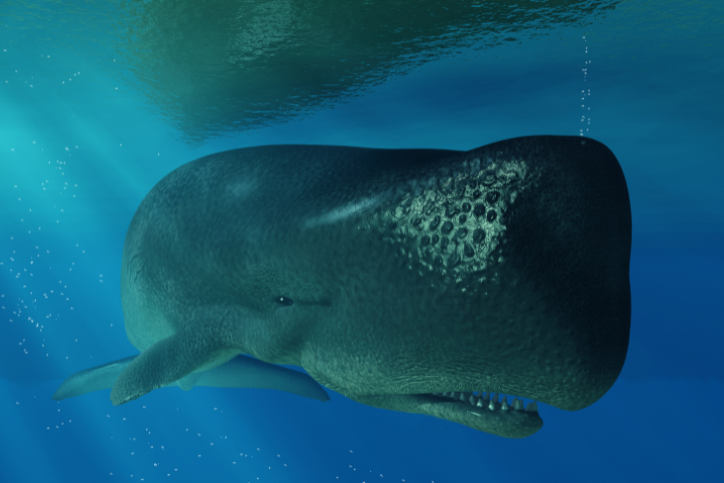The sperm whale is a unique species of mammal found all over the world. Especially in the Mediterranean, most of them, a few hundreds, live in the very deep waters south of Crete.
Only a few people know that there are whales in Greece, although Aristotle has already recorded their existence. It is noteworthy that South Crete is the only place in the world where you can admire the whales all year round.
Something very unusual is happening in Crete. The sperm whales reproduce continuously, and the females with their young and the normally solitary males are together all year round. This doesn’t happen anywhere else in the world! Why is that? The Mediterranean sperm whales find very good conditions here, so they stopped migrating. In fact, the main reason for the high concentration of whales in this region seems to be the enormous depth of water. A few kilometers from the shore, the sea already reaches a depth of 2000m, while the sea between Crete and the Peloponnese becomes 5120m deep. This part (also called Greek Abyss) is rich in large squid, the most popular food of whales.
Sperm whales are the largest predators on our planet. Sperm whales look like ordinary whales, but they have teeth (instead of root bones), so they are closely related to dolphins. Their teeth are up to 20 centimeters long. They hunt for squid in the deep sea. Scars from suction cups indicate fights with giant squids up to 18 meters tall.
To eat these squid, sperm whales dive to a depth of 500-1000 meters for 20-60 minutes, although their deepest dives go up to 2000 m and can last at least 2 hours. The whales live up to 70 years. Males reach a length of 18m and a weight of 57 tons.
Females become sexually mature at 7 years, males at 18 years. After 14-16 months, female sperm whales give birth to a single sperm whale baby.
The females form social groups together with the adolescents, while males usually live lonely. In general, male sperm whales only seek a female once every three years to reproduce. Only in Crete they are always ready to mate and therefore always travel in groups.
For us humans, the sperm whales do not pose a danger, since their behavior is not aggressive without provocation and their habitat is in the open sea.
Sperm whales are considered endangered in the Mediterranean, mainly because of surface fishing nets. These are very thin, almost invisible nets that stretch for several kilometers to catch tuna and swordfish. Efforts are currently being made to limit their use in this area.
Also a major threat to these and many other marine mammals is the noise pollution caused by the intense shipping traffic in the Mediterranean. The sounds of ships confuse them and disrupt their communication.
In addition, there are always collisions between sperm whales and ships. In Greece alone, 60% of all stranded whales have such injuries.
To avoid collisions, the association OceanCare and the Greek Pelagos Cetacean Research Institute are working on a collision warning system that shows the ships the position of the whales and thus allows them to dodge.
The area therefore urgently needs to be protected. A corresponding application by OceanCare and Pelagos was approved by the Mediterranean countries. Now it is up to the Greek government to establish a protected area.

